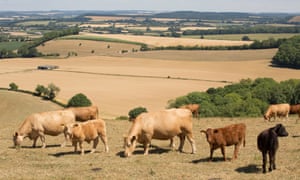https://www.theguardian.com/environment/2019/feb/12/nearly-a-fifth-of-eu-budget-goes-on-livestock-farming-greenpeace
Nearly a fifth of the EU's budget goes on livestock farming, says Greenpeace
Europe urged to promote diets lower in meat and dairy and restrict animals to grass-based systems to free land for crops
Nearly a fifth of the EU’s total budget – more than £24bn of taxpayer money – goes to support livestock farming across Europe, according to new researchby Greenpeace.
At a time when scientists are calling for significant reductions in meat consumption, the report’s authors say taxpayers’ money should be redirected away from grain-fed, industrial animal farming.
Last month, the Eat-Lancet Commission of scientists called for a new plant-focused diet to help avoid dangerous levels of climate change and the destruction of wildlife. Such a diet would require cutting red meat consumption in Europe by 77%.
Public Health England’s dietary guidelines recommend that meat and dairy, including non-animal-based protein alternatives such as beans and pulses, should make up no more than our 20% of dietary intake.
Yet, Europeans eat more than twice as much meat as national dietary authorities recommend, as well as twice the global average.
“Adopting diets lower in meat and dairy would not only tackle health problems but would also reduce the pressure on land, freeing up more space for nature,” said the Greenpeace EU agriculture policy director Marco Contiero.
Researchers from Greenpeace used publicly available data from the European Commission and Eurostat to estimate farm subsidies and land tied to rearing livestock.
Researchers calculated that 125 million hectares (308 million acres) of land in Europe is used to graze livestock or produce feed – this includes more than 60% of arable land that could otherwise be used to grow food directly for human consumption. Intensively raised livestock is given specialised feeds, including soy and wheat, that fatten them up faster, rather than by grazing on grasslands.
This land, and other targeted subsidies for livestock, is worth between €28-€32bn (£24-£27.9bn) in CAP direct payments per year for the animal farming sector, 18-20% of the EU’s total budget.
Instead of the intensive model of grain-fed livestock, the campaigners argue that meat and dairy production should be restricted to grass-based systems, where the animals are reared outdoors and fed a largely grass-based diet. This would free up large amounts of land to growing crops directly for human consumption.
“If Europe produced and consumed exclusively grass-fed livestock, we’d be a long way towards producing and consuming less and better meat and dairy in line with what science tells us is necessary to protect nature, the climate and our health,” said Contiero.
However other groups argue that intensively reared livestock is less carbon intensive than grass-fed meat, because it uses less land.
Greenpeace said that EU farm subsidies should be redirected towards incentivising more fruit and vegetable production.
The consumption of animal protein in Europe has increased by 80% since the 1960s, driven by an increase in meat and dairy production in the region. Globally, livestock is using almost 80% of the world’s farmland, yet delivering just 18% of our calories.
“In the long run it makes increasingly less sense to incentivise production that creates more costly impacts to society than economic benefits,” said Professor Tim Benton, the UK’s former “food security champion”.
“Farmers are not the ‘bad guys’ in a simplistic story: they are trapped in a system that rewards producing more at the expense of wider social costs arising from environmental and health impacts,” he said.
The Pasture-Fed Livestock Association said the research had clearly identified that environmental damage does not arise from livestock per se, but as a result of the way in which some animals are reared.
“The problem is the intensification of livestock production across Europe made possible through feeding grains to animals. Such practices have resulted in fewer small mixed farms and more specialised farms and monoculture production systems – along with a corresponding increase in fossil fuel consumption, nitrate fertiliser production, air and water pollution [and] loss of biodiversity,” said the executive secretary, Russ Carrington.


沒有留言:
張貼留言